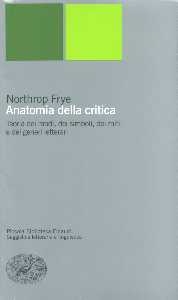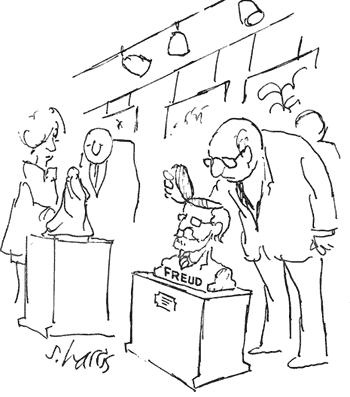
I wanted to follow up the intriguing debate concerning Frye’s view of human desire and its limitations. Frye addresses the question squarely in the closing section of chapter 2 of The Secular Scripture. He first introduces the doubled heroine motif, which he recurs to throughout the book, as one version of complementary poles: “In English literature, perhaps the purest evocations of the idyllic world are Milton’s L’Allegro and Il Penseroso, where the alternating rhythm of ritual and dream, the need to experience as part of a community and the need to experience as a withdrawn individual, have been transformed into complementary creative moods” (59). He then writes, in the closing paragraph:
The mythological universe has two aspects. In one aspect it is the verbal part of man’s own creation, what I call a secular scripture; there is no difficulty about that aspect. The other is, traditionally, a revelation given to man by God or other powers beyond himself. These two aspects take us back to Wallace Stevens’s imagination and reality. Reality, we remember, is otherness, the sense of something not ourselves. We naturally think of the other as nature, or man’s actual environment, and in the divided world of work and ego-control it is nature. But for the imagination it is rather some kind of force or power or will that is not ourselves, an otherness of spirit. Not all of us will be satisfied with calling the central part of our mythological inheritance a revelation from God, and, though each chapter in this book closes on much the same cadence, I cannot claim to have found a more acceptable formulation. It is quite true that if there is no sense that the mythological universe is a human creation, man can never get free of servile anxieties and superstitions, never surpass himself, in Nietzsche’s phrase. But if there is no sense that it is also something uncreated, something coming from elsewhere, man remains a Narcissus staring at his own reflection, equally unable to surpass himself. Somehow or other, the created scripture and the revealed scripture, or whatever we call the latter, have to keep fighting each other like Jacob and the angel, and it is through the maintaining of this struggle, the suspension of belief between the spiritually real and the humanly imaginative, that our own mental evolution grows. (59-61)
This both/and principle runs through the book. At the end of chapter 1, he writes that “[t]he great classics of literature . . . are following the dictates of common sense, as embodied in the author of Ecclesiastes: ‘Better is the sight of the eye than the wandering of desire.'” They are “‘what the eye can see: it is the genuine infinite as opposed to the phony infinite, the endless adventures and endless sexual stimulation of the wandering of desire.” But he immediately adds, closing the paragraph: “But I have a notion that if the wandering of desire did not exist, great literature would not exist either” (30). He then concludes:
There is a line of Pope’s which exists in two versions: ‘A mighty maze of walks without a plan,’ and ‘A mighty maze, but not without a plan.’ The first version recognizes the human situation; the second refers to the constructs of religion, art, and science that man throws up because he finds the recognition intolerable. Literature is an aspect of the human compulsion to create in the face of chaos. Romance, I think, is not only central to literature as a whole, but the area where we can see most clearly that the maze without a plan and the maze not without a plan are two aspects of the same thing. (30-31)
Frye observes later in his argument that “[t]here is a strongly conservative element at the core of realism, an acceptance of society in its present structure” (164). The same is true of comedy, which “ends with a festive society” and “is contained by social assumptions.” And of course if it were not for tragedy, as Frye says in Anatomy, “all literary fictions might be plausibly explained as expressions of emotional attachments, whether of wish-fulfilment or of repugnance: the tragic fiction guarantees, so to speak, a disinterested quality in literary experience,” as “the main characters are emancipated from dream, an emancipation which is at the same time a restriction, because the order of nature is present” (206-07 in the Princeton edition). Romance, in contrast, is “the nearest of all literary forms to the wish-fulfilment dream” (186). Now most critics and readers, met with such an observation on its own, would probably take this to be a condemnation of romance, very much along traditional lines: romance is escapist fiction, a form of day-dreaming or literary masturbation. But that is not how Frye means it. Not by a long shot. This wish-fulfilment is the basis of a revolutionary or “genuinely ‘proletarian’ element in romance . . . which is never satisfied with its various incarnations, and in fact the incarnations themselves indicate that no matter how great a change may take place in society, romance will turn up again, as hungry as ever, looking for new hopes and desires to feed on” (186). This seems to be Merv Nicholson’s point about Frye and desire, and this is perhaps why Frye deems Utopia the greatest form of prose fiction, because it is the form of no place. There is an essential complementarity, an equality and fraternity, among the mythoi, but romance is Frye’s favorite child, precisely because, endlessly propelled by desire, “it has no continuing city as its resting place” (172). The passage I quoted at the beginning of this posting ends, significantly, with the following sentence: “The improbable, desiring, erotic, and violent world of romance reminds us that we are not awake when we have abolished the dream world: we are awake only when we have absorbed it again.” Inescapable romance, inescapable choice of dreams . . .

